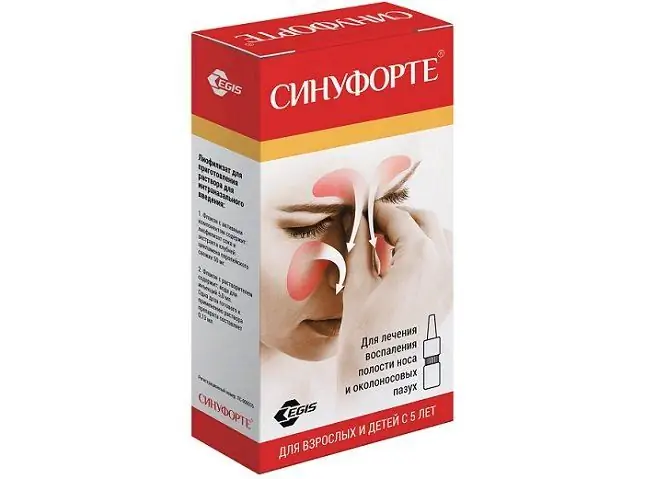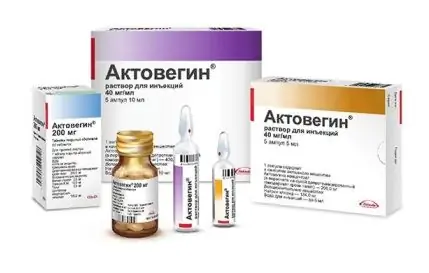- Author Rachel Wainwright wainwright@abchealthonline.com.
- Public 2023-12-15 07:39.
- Last modified 2025-11-02 20:14.
Zytiga
Zitiga: instructions for use and reviews
- 1. Release form and composition
- 2. Pharmacological properties
- 3. Indications for use
- 4. Contraindications
- 5. Method of application and dosage
- 6. Side effects
- 7. Overdose
- 8. Special instructions
- 9. Application during pregnancy and lactation
- 10. Use in childhood
- 11. In case of impaired renal function
- 12. For violations of liver function
- 13. Drug interactions
- 14. Analogs
- 15. Terms and conditions of storage
- 16. Terms of dispensing from pharmacies
- 17. Reviews
- 18. Price in pharmacies
Latin name: Zytiga
ATX code: L02BX03
Active ingredient: abiraterone (Abiraterone)
Manufacturer: Pateon Inc. (Patheon Inc.) (Canada); Patheon France (France)
Description and photo updated: 2019-30-05
Prices in pharmacies: from 209,425 rubles.
Buy

Zytiga is a non-steroidal drug with an antitumor antiandrogenic effect, used in the combined treatment of metastatic castration-resistant prostate cancer.
Release form and composition
Zitiga dosage form:
- tablets: oval biconvex, from white to almost white, engraved "AA250" (in a cardboard box 1 bottle of 120 tablets);
- film-coated tablets: oval biconvex, brownish-pink, on one side with an engraving "AA", on the other side - "500" (in a cardboard box 5 blisters of 6 or 12 tablets).
Each pack also contains instructions for the use of Zitiga.
Composition of 1 tablet:
- active substance: abiraterone acetate - 250 mg;
- auxiliary components: croscarmellose sodium - 42.9 mg; lactose monohydrate - 198.65 mg; sodium lauryl sulfate - 28.6 mg; microcrystalline cellulose - 141.22 mg; povidone (K29 / K32) - 35.75 mg; colloidal silicon dioxide - 7.15 mg; magnesium stearate - 10.73 mg.
Composition of 1 film-coated tablet:
- active substance: abiraterone acetate - 500 mg;
- auxiliary components: microcrystalline siliconized cellulose - 184.8 mg; croscarmellose sodium - 56 mg; magnesium stearate - 16.8 mg; sodium lauryl sulfate - 56 mg; colloidal silicon dioxide - 8.4 mg;
- shell: Opadry II85F90093 purple (titanium dioxide - 23.1%; polyvinyl alcohol - 40%; talc - 14.8%; macrogol 3350 - 20.2%; iron oxide red - 1.4%; iron oxide black - 0, 5%) - 33.6 mg.
Pharmacological properties
Pharmacodynamics
Abiraterone acetate, the active substance of Zytigi, is transformed into abiraterone, which is an inhibitor of androgen synthesis. Abiraterone, in particular, selectively inhibits the activity of the enzyme CYP17 (17a-hydroxylase / C17,20-lyase), which is expressed and is required for androgen biosynthesis in the adrenal glands, testes and prostate tumor cells. CYP17 catalyzes the transformation of progesterone and pregnenolone by 17a-hydroxylation and cleavage of the C 17.20 bond to dehydroepiandrosterone and androstenedione (respectively), which are testosterone precursors. Also, against the background of inhibition of CYP17 activity in the adrenal glands, the biosynthesis of mineralocorticoids is enhanced.
Androgen-sensitive prostate cancer responds to androgen-lowering therapy. Thanks to antiandrogenic therapy (for example, orchiectomy or the use of gonadotropin-releasing hormone agonists - luliberin), androgen biosynthesis is weakened in the testes. However, it does not affect the synthesis of androgens in the adrenal glands and in the tumor. The use of Zytigi in combination with luliberin agonists (or orchiectomy) helps to reduce the serum testosterone concentration in the blood to a level that is below the detection threshold.
In patients with prostate cancer, the PSA (prostate-specific antigen) concentration serves as a biomarker.
The proportion of patients who had a palliative analgesic effect compared with the placebo group was significantly higher when using Zytigi. Also, in comparison with patients who received placebo, against the background of the use of the drug, progression of pain syndrome was noted in a smaller proportion of patients. The same indicators are typical for bone lesions, which include pathological fractures, palliative bone irradiation, spinal compression, and bone surgery.
Pharmacokinetics
The pharmacokinetics of abiraterone and abiraterone acetate were studied in healthy volunteers, in patients with advanced metastatic prostate cancer, and in non-cancer patients with hepatic or renal failure. Abiraterone acetate is rapidly transformed into abiraterone, which is an inhibitor of androgen biosynthesis.
The time to reach the maximum plasma concentration (T Cmax) of abiraterone in the blood after oral administration of the drug on an empty stomach is approximately 2 hours. Against the background of application with food, in comparison with fasting, there is a tenfold increase in AUC (area under the concentration-time curve). Also, the value of C max (maximum concentration) of a substance in plasma increases by 17 times, depending on the fat content of the food taken. Given the normal variety of the diet, the use of Zitiga with food can have a variety of systemic effects, and therefore it is impossible to take the drug with meals.
Labeled 14 C-abiraterone binds to the plasma protein at the level of 99.8%. The apparent V d (volume of distribution) is about 5630 liters, which indicates that abiraterone is actively distributed in peripheral tissues.
After oral administration of 14 C-abiraterone acetate in capsules, abiraterone acetate is hydrolyzed to abiraterone, which is further metabolized, including by sulfation, hydroxylation and oxidation, mainly in the liver. Most of the circulating 14 C-abiraterone (approximately 92%) is in the form of abiraterone metabolites. Of the 15 detectable metabolites, each of the two main metabolites - abiraterone sulfate and abiraterone sulfate N-oxide - accounts for 43% of the total radioactivity.
According to the results of studies that were carried out with the participation of healthy volunteers, the average T 1/2 (half-life) of abiraterone in plasma is about 15 hours. With oral administration of labeled acetate 14 C-abiraterone at a dose of 1000 mg, approximately 88% of the radioactive dose is excreted through the intestine and about 5% by the kidneys. The main substances found in feces are unchanged abiraterone and abiraterone acetate (about 22 and 55% of the dose, respectively).
The pharmacokinetic parameters of abiraterone were studied in patients with mild to moderate hepatic insufficiency (according to the Child-Pugh classification - class A and B, respectively) and in healthy volunteers. After a single oral dose of 1000 mg, the systemic exposure to abiraterone increased by about 11 and 260%, and the average T 1/2 increased to about 18 and 19 hours in patients with mild and moderate hepatic insufficiency, respectively.
In patients with mild hepatic impairment, dose adjustment of Zytigi is not required. In case of moderate and severe hepatic insufficiency (according to the Child-Pugh classification - class B and C), Zitiga is not recommended to be prescribed, since it is impossible to predict the necessary dose adjustment in this case. In case of moderate impairment of hepatic function, the drug can be used with caution if the expected benefit outweighs the possible risk, in severe violations, Zitiga is contraindicated.
Patients who develop hepatotoxicity during treatment may require dose adjustment and temporary discontinuation of Zytigi.
The pharmacokinetic parameters of abiraterone were compared in patients with end-stage renal failure who received a standard hemodialysis regimen and in patients with no renal impairment. After oral administration of 1000 mg in patients with end-stage renal disease receiving hemodialysis, the systemic exposure to abiraterone acetate did not increase. Patients with prostate cancer with severe renal dysfunction should be prescribed the drug with caution due to the lack of clinical data.
Indications for use
Zytiga in combination with prednisone is prescribed for the treatment of metastatic castration-resistant prostate cancer.
Contraindications
Absolute:
- severe liver dysfunction;
- age up to 18 years;
- individual intolerance to the components of the drug.
Relative (Zitiga tablets are prescribed under medical supervision):
- severe renal dysfunction;
- moderate impairment of hepatic function;
- lactose intolerance, lactase deficiency, glucose-galactose malabsorption;
- heart failure, recent myocardial infarction or ventricular arrhythmia, left ventricular ejection fraction less than 50%, NYHA functional class III - IV heart failure (patients whose condition may worsen with hypokalemia or increased blood pressure).
Zytiga, instructions for use: method and dosage
Zytig tablets are taken orally, preferably 1 hour before or 2 hours after a meal. Simultaneous intake with food is prohibited. The tablets should be swallowed whole, without chewing, and washed down with a little water.
The recommended daily dose of Zitiga is 1000 mg. The drug is used in combination with low doses of prednisolone (10 mg per day).
Before starting therapy, every 2 weeks during the first three months of Zytigi's use, and then monthly, it is necessary to measure the concentration of bilirubin and the activity of serum transaminases. Blood pressure, potassium concentration in the blood and the degree of fluid retention in the body should be monitored monthly. If you miss the next daily dose of Zytigi and / or prednisolone, the next day you need to take the usual, not doubled dose of the missed drug.
If signs of hepatotoxicity develop during therapy, the drug should not be used until the liver function indicators are normalized. After the normalization of the indicators, therapy is resumed at a daily dose of 500 mg. In such cases, monitoring of the concentration of bilirubin and the activity of serum transaminases for three months should be carried out at least every two weeks, then monthly. If, when taking a dose of 500 mg, signs of hepatotoxicity appear, Zitiga is canceled.
Side effects
Most often, when using Zytiga, the development of disorders such as hypokalemia, peripheral edema, increased blood pressure, hematuria, urinary tract infections, an increase in the activity of aspartate aminotransferase and alanine aminotransferase, fractures, dyspepsia is observed.
Possible adverse reactions from systems and organs [> 10% - very often; (> 1% and 0.1% and <1%) - infrequently; (0.01% and <0.1%) - rarely; <0.01% - very rare]:
- gastrointestinal tract: very often - diarrhea; often - dyspepsia;
- respiratory system: rarely - allergic alveolitis;
- endocrine system: infrequently - adrenal insufficiency;
- musculoskeletal tissues: often - fractures (except pathological fractures); infrequently - myopathy, rhabdomyolysis;
- cardiovascular system: very often - increased blood pressure; often - arrhythmia, angina pectoris, tachycardia, atrial fibrillation, heart failure, including acute heart failure, left ventricular failure, decreased left ventricular ejection fraction; with an unknown frequency - myocardial infarction;
- kidneys and urinary tract: often - hematuria;
- infectious diseases: very often - urinary tract infections; often - sepsis;
- skin and subcutaneous tissue: often - skin rash;
- laboratory tests: very often - hypokalemia; often - increased activity of alanine aminotransferase / aspartate aminotransferase, hypertriglyceridemia;
- general disorders: very often - peripheral edema.
Overdose
Information on drug overdose is limited.
Therapy: Zytigi cancellation, general supportive measures, including arrhythmia control. It is also necessary to monitor liver function. The specific antidote is unknown.
special instructions
Reception of Zitigi simultaneously with food leads to a significant increase in the absorption of abiraterone. The safety and efficacy of the drug taken with food have not been studied, therefore, you cannot take Zitiga with meals.
During the period of therapy, an increase in blood pressure, the development of hypokalemia and fluid retention are possible, which is associated with an increase in the concentration of mineralocorticoids as a result of inhibition of the CYP17 enzyme. The stimulating effect of ACTH (adrenocorticotropic hormone) weakens corticosteroid intake, which leads to a decrease in the severity and frequency of these adverse events. When treating patients whose clinical condition may worsen against the background of increased blood pressure, the development of hypokalemia or fluid retention in the body (in particular, with heart failure, recent myocardial infarction or ventricular arrhythmia), caution should be exercised.
The safety of Zytigi in patients with left ventricular ejection fraction <50% or with heart failure III - IV functional class (according to the NYHA classification) has not been established. For patients with a history of cardiovascular disease, the drug is prescribed with caution.
Before using Zitiga, it is necessary to correct the increase in blood pressure and hypokalemia.
Plasma potassium concentration in the blood, the degree of fluid retention and blood pressure should be monitored at least once a month.
During clinical trials, a pronounced increase in the activity of hepatic enzymes was recorded, which required discontinuation of the drug or dose adjustment. The activity of serum bilirubin and transaminases must be measured before starting therapy, once every two weeks during the first three months of treatment, and then monthly. With the development of clinical signs and symptoms that suggest impaired hepatic function, it is necessary to immediately measure the activity of serum transaminases.
In the case of an increase in the activity of aspartate aminotransferase or alanine aminotransferase 5 times higher than the ULN (upper limit of the norm) or the concentration of bilirubin 3 times higher than the ULN, Zytiga is immediately canceled, and careful monitoring of liver function is required. Treatment can be resumed only after these indicators have returned to their original values, and only if lower doses are prescribed.
With the development of a severe form of hepatotoxicity in any period of therapy (if the VGN activity of alanine aminotransferase or aspartate aminotransferase is 20 times higher), the drug is canceled without the possibility of re-appointment.
Zitiga is not intended for use in women. There is an assumption that the use of CYP17 inhibitors in pregnant women leads to a change in the concentration of hormones, which may affect the development of the fetus. In order to prevent accidental exposure, pregnant or pregnant women should not work with Zytiga without gloves.
There is no information about whether abiraterone or its metabolites are present in semen. When planning sexual intercourse with a pregnant woman, it is necessary to use a condom, with a woman of childbearing age - in addition to a condom, it is recommended to use other effective methods of contraception.
Studies of the toxic effects of abiraterone acetate on the reproductive system have not been conducted, there is no information on the effect of the drug on the ability to conceive.
When withdrawing prednisolone, caution should be exercised and the signs of adrenal cortex insufficiency should be monitored. If Zytiga is not canceled after cessation of glucocorticosteroid therapy, the appearance of signs of mineralocorticoid excess should be monitored. When stressful situations develop in patients receiving prednisone, an increased dose of glucocorticosteroids may be required before, during and after such a situation.
The efficacy and safety of the combined use of Zytiga with cytotoxic chemotherapy have not been established.
Patients on a controlled sodium diet should note that each dose (1000 mg, 250 mg tablet formulation) contains 27.2 mg (1 mmol) sodium.
Application during pregnancy and lactation
Zitiga is not used in women. There is no information on the use of the drug in pregnant women.
The use of Zytiga in pregnant women and women capable of becoming pregnant is contraindicated. There is no information about whether abiraterone acetate or its metabolites are excreted in milk.
Pediatric use
Zitiga is not prescribed for patients under 18 years of age.
With impaired renal function
In case of severe impairment of renal function in patients with prostate cancer, the drug should be used with caution, since there are no clinical data on the use of Zitiga in this group of patients.
For violations of liver function
Zitiga is contraindicated for severe liver dysfunctions. For patients with moderate impairment of hepatic function, the drug can be prescribed with caution, provided that the expected benefit from therapy exceeds the possible risk of developing severe adverse reactions. With mild hepatic impairment, dose adjustment is not required.
Development of hepatotoxicity in the course of treatment may require dose adjustment and temporary cancellation of Zytigi.
Drug interactions
When conducting studies on healthy volunteers of the pharmacokinetic interaction of a strong inducer of the isoenzyme CYP3A4 - rifampicin, at a daily dose of 600 mg for 6 days and then a single dose of 1000 mg of abiraterone acetate, a decrease in the average plasma AUC ∞ of abiraterone by 55% was noted.
Simultaneous use of Zytigi with strong inducers of the CYP3A4 isoenzyme (phenytoin, carbamazepine, rifampicin, rifabutin, rifapentin, phenobarbital) should be avoided. The appointment of this group of drugs is possible only after a thorough assessment of clinical efficacy.
Abiraterone inhibits hepatic isoenzymes that are involved in the metabolism of drugs - CYP2C8 and CYP2D6.
In clinical studies, when determining the effectiveness of abiraterone acetate in combination with prednisone per 1 dose of dextromethorphan (CYP2D6 substrate), the systemic exposure of the latter increased by approximately 200%, and the AUC 24 for the active metabolite of dextromethorphan (dextrorphan) increased by approximately 33%.
With simultaneous administration with drugs that are metabolized by the CYP2D6 isoenzyme, caution is recommended. This is especially true for drugs with a narrow therapeutic index. In such cases, the possibility of reducing the dose of drugs with a small range of safe action, which are metabolized by the isoenzyme CYP2D6, should be considered, including drugs such as propranolol, metoprolol, desipramine, haloperidol, venlafaxine, risperidone, tramadol, propafenone, codeine, flecainide and oxycodone.
When determining the effectiveness of abiraterone acetate (in combination with prednisone) per 1 dose of the CYP1A2 substrate theophylline, during the same study, the systemic effect of the latter was not observed.
Clinically significant increases in the pharmacological effect of Zytiga, provided that it is used in combination with other drugs that are eliminated mainly by CYP2C8, are not expected. However, with this combination treatment, patients should be monitored for signs of toxicity associated with a narrow therapeutic index CYP2C8 substrate.
Analogs
Zitiga's analogues are Abirateron, Abirateron-TL, Abirateron AF, Abitera, Theronred, Amiranta.
Terms and conditions of storage
Store at temperatures up to 25 (for 500 mg tablets) or 30 ° C (for 250 mg tablets) in the original container. Keep out of the reach of children.
Shelf life is 2 years.
Terms of dispensing from pharmacies
Dispensed by prescription.
Reviews about Zitiga
Since the drug was recently registered and is used exclusively as part of a combination treatment, there are not enough reviews of Zitiga, which allow judging the effectiveness and safety of clinical use, from patients.
According to the results of multicenter randomized studies of phase II-III prostate cancer using androgen synthesis blockers (abiraterone acetate), experts argue that the sequential administration of Zytiga in the 2nd and 3rd lines of therapy (after taxanes in the 1st line and cabazitaxel in the 2nd 1st line) in patients with metastatic prostate cancer can increase life expectancy and improve its quality.
Price for Zitiga in pharmacies
Approximate price for Zitiga, tablets 250 mg, 120 pcs. in the package is 161,035 rubles.
Zytiga: prices in online pharmacies
|
Drug name Price Pharmacy |
|
Zytiga 250 mg tablets 120 pcs. RUB 209425 Buy |

Maria Kulkes Medical journalist About the author
Education: First Moscow State Medical University named after I. M. Sechenov, specialty "General Medicine".
Information about the drug is generalized, provided for informational purposes only and does not replace the official instructions. Self-medication is hazardous to health!






